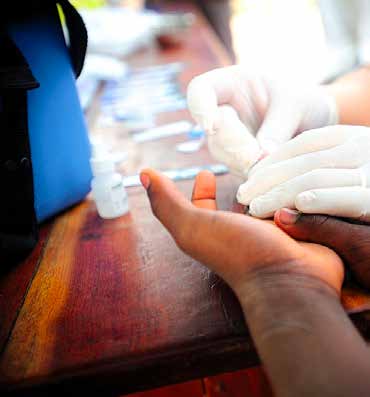Don’t forget about HIV during COVID-19
Don’t forget about HIV during COVID-19 UrsulaHealth Minister Dr Zweli Mkhize has urged all South Africans to be tested for HIV and, if positive, to take their medication correctly. 
This is because if you know your HIV status and take your treatment properly, you will remain virally suppressed, with a strong immune system. “This plays a crucial role in protecting you from contracting other diseases, including the Coronavirus Disease (COVID-19),” says Dr Mkhize.
“This is why we came up with the campaign called Cheka Impilo (Know your health status). This campaign is designed to remind you that the power of healing is in your hands and that we are here to reach out, guide and assist you in every way so you can reach your full life potential,” he says.
Dr Mkhize says that as we approach World AIDS Day, we need to remind ourselves that HIV and AIDS is still a pandemic in this country, more threatening than COVID-19.
“Knowing one’s HIV status will assist in the management of the disease if one is HIV positive. You can get treatment and live a long and healthy life,” he adds.
He is concerned because the COVID-19 pandemic has made people reluctant to seek medical care for other conditions, like HIV. According to Dr Mkhize, HIV testing fell by 46% between April and June.
Dr Mkhize says it is now time for the country to refocus on the other diseases that kill thousands each year, and not just COVID-19.
Successes
Launched in 2005, South Africa has the world’s largest antiretroviral therapy (ART) programme, which has helped reduce the number of AIDS-related deaths.
In July 2019, the Joint United Nations Programme on HIV/AIDS (UNAIDS) said that South Africa had successfully reduced new HIV infections by more than 40% and AIDS-related deaths by around 40% since 2010.
South Africa has also been praised for its progress in meeting the UNAIDS's 90-90-90 goals, which aim for 90% of people to know their HIV status, 90% to be virally supressed and 90% to be on ARVs.
In 2018, it was announced that the country had reached the first 90% when over 90% of people living with HIV in South Africa were found to be aware of their HIV status. In 2019, UNAIDS confirmed that three districts in KwaZulu-Natal had reached 90-90-90, well before the target of 2020. The districts are Ugu, Umzinyathi and Umkhanyakude. Earlier this year, Dr Mkhize said that Harry Gwala had also reached this milestone.
Get tested and take your meds
UNAIDS says a person may feel perfectly healthy for several years after becoming infected with HIV, and may be at risk of passing the virus on to others.
South African AIDS organisation AVERT says testing is the only way to know for sure if you have HIV. Knowing your status means you can keep yourself and your sexual partners healthy and start treatment early, which gives you a better chance of living a long and healthy life.
AVERT says it is important to take your medication at the right time every day or the level of HIV in your blood may increase and the treatment may stop working. This is known as developing drug resistance.
It says ART reduces the level of HIV in your blood so that it cannot damage your immune system, which helps your body fight infections.